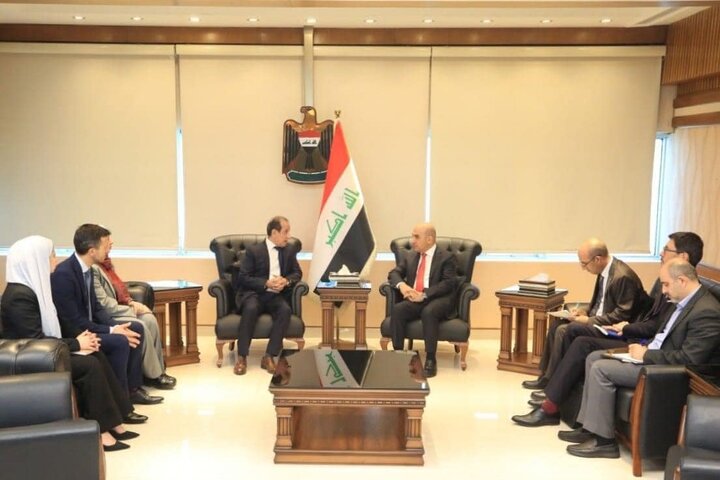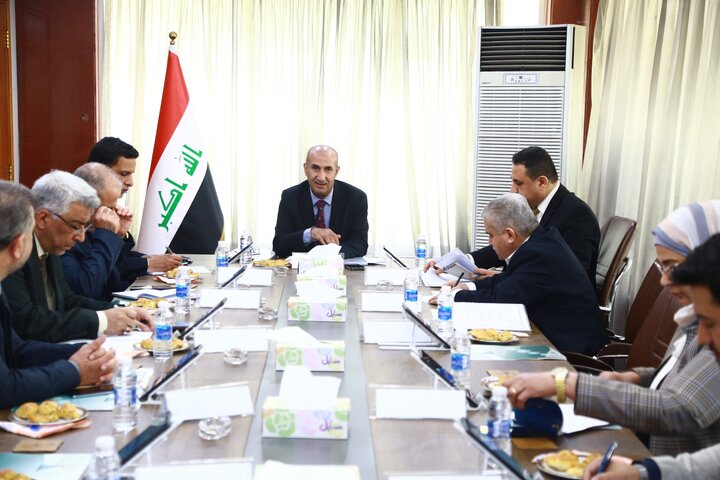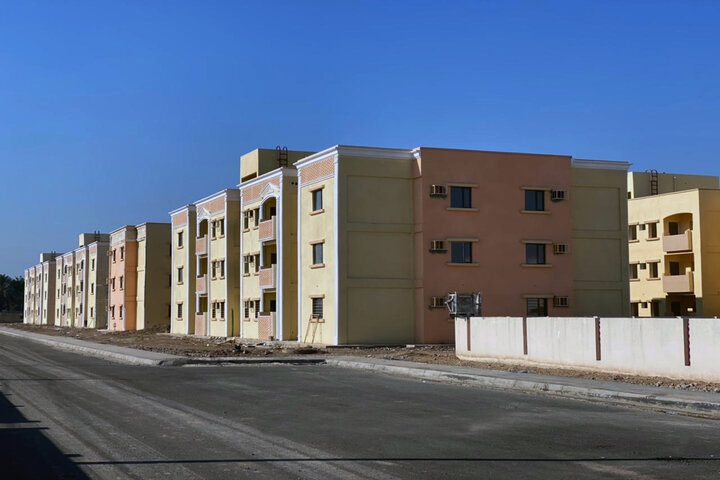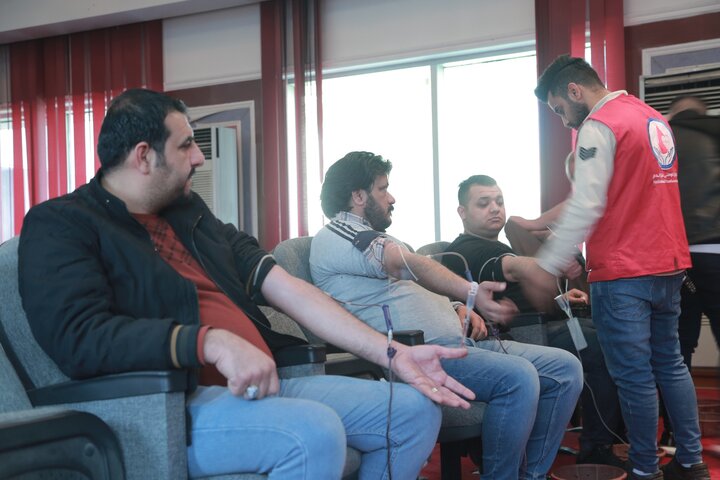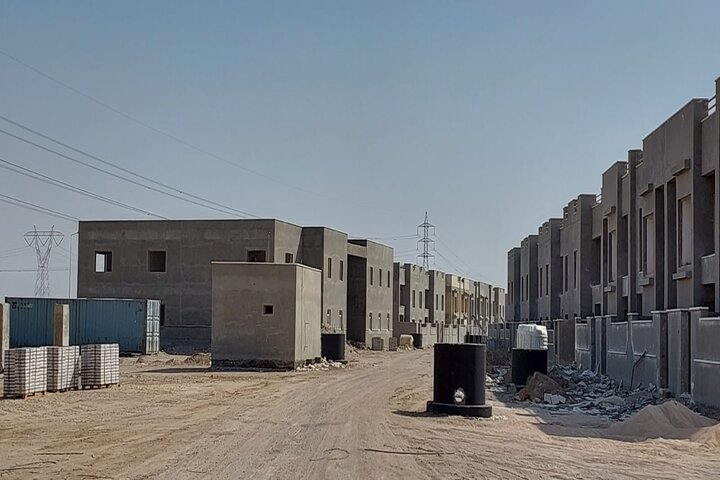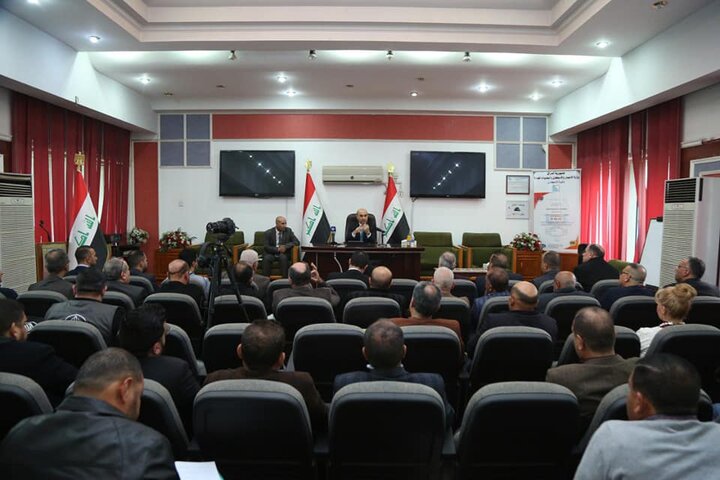The Minister of Construction, Housing and Public Municipalities, Benkin Rikani, discussed at the Ministry’s headquarters ways to support the housing sector with the Director of the United Nations Human Settlements Program (Habitat) in Iraq, Mr. Wael Al-Ashhab, and representatives of the International Labor Organization and the World Trade Center, in the presence of the Director General of the Directorate of Housing.
The Minister stated during the meeting that the Council of Ministers decided, in its last session, to form a central committee to standardize building standards and new residential cities, with the aim of preserving state funds and organizing the planning aspects of the cities; He also welcomed any support that works to raise the capabilities of the Directorate of Housing affiliated to the Ministry, develop the performance of its employees, and provide it with modern electronic systems that provide accurate data on the housing sector to draw up policies and implementation mechanisms.
Director of (Habitat) in Iraq, reviewed the cooperation agreement signed between the Iraqi government and the European Union, regarding programs and projects funded by the Union and in cooperation with ministries, including the Ministry of Construction, indicating that the agreement includes supporting the government in developing the housing sector, training and creating job opportunities for youth, and providing low-cost housing for limited and low-income people.
The Directorate of Housing holds a board meeting for the month of February 2023
Under the chairmanship of the Chairman of the Board of Directors of the Directorate of Housing, Mr. (Sadiq Muhammad Hassan), the meeting of the first session of the Board of Directors was held for the month of February (28/2/2023), and in the presence of Board members from various ministries.
The meeting began with a speech from the Director General, who started by welcoming the attending members and urging them to exert maximum efforts and present the best results to the Directorate.
The Board of Directors discussed a number of topics on the agenda in its meeting, the most important of which was addressing work problems and the general situation of the Directorate. At the end of the meeting, the Director General expressed his optimism about the important development that took place in the course of work in the interest of our dear country, and stressed that he was confident that the future is better and there is greater success in light of the keenness and assurance of the Board of Directors of the Directorate to keep pace with the continuous development.
The Directorate of Housing organizes a course entitled (furnishing streets and sidewalks for residential complexes)
The Department of Planning and Follow-up / Division of Training and Development in the Directorate of Housing, one of the formations of the Ministry of Construction, Housing and Public Municipalities, organized a course entitled (furnishing streets and sidewalks for residential complexes)
The course curriculum was lectured by Eng. (Zeinah Habeeb Nasser), Senior Chief Engineer in the Certification and Engineering Consultation Department, Architectural Designs Division, at the Directorate of Housing headquarters on Thursday morning 3/2/2023, with the participation of a number of the Directorate’s employees, including road engineers, architects, structural and civil engineers.
The lecture touched on several topics, including (basic shapes and patterns of urban streets – definition of pavement and its purpose – elements of fixing sidewalks (greening – columns – traffic lights – advertising, paving sidewalks and width of sidewalks) and design requirements for streets and sidewalks for people with disabilities.
The aim of the course was to know the standards that should be applied to the streets and sidewalks of residential complexes, including bicycle paths and special paths for people with disabilities, in order to upgrade and improve the housing reality of urban streets within residential complexes.
Achieving an advanced work rate in the Al-Jazeerah (2) residential project in Karbala Governorate
The Directorate of Housing, one of the formations of the Ministry of Construction, Housing and Public Municipalities, continues to work on Al-Jazeera / 2 housing project in Karbala Governorate, which is being executed by Al-Mansour General Contracting Company, one of the Ministry’s formations, with a completion rate of 70% and the number of housing units amounting to (632) apartments.
The contract cost of the project after the appeal amounted to (74,517,000) billion dinars, as the prices of the unimplemented items in the schedule of quantities according to the original contract were approved, where the project was described as multi-storey residential buildings (four floors) with two models of residential buildings, and they include type (A) = 53 building (424 apartments) as it contains two apartments on each floor, and type (B) = (13) building (208 apartments) as it contains four apartments on each floor.
The residential complex also contains public service buildings (kindergarten, nursery, primary school with a capacity of 18 classrooms, 2 intermediate schools with a capacity of 12 classrooms, markets, health center, administrative building, 2 guard rooms with service networks (pure water and fire, rainwater drainage network, heavy water drainage network with heavy water treatment unit, external and internal electrical networks, telephone, external site works of external fences, streets, sidewalks, walkways, parking lots and landscape works (yards , rest areas , organizing gardens, afforestation and furniture, etc.).
With a completion rate of 87%, work continues on Alghalibiah housing project in Diyala Governorate
The Directorate of Housing, one of the formations of the Ministry of Construction, Housing and Public Municipalities, continues to work on Alghalibiah housing project in Diyala Governorate, with a completion rate of 87%, at a cost of (26,400,000) billion dinars, and with a number of housing units amounting to (696) apartments.
The complex consists of (58) residential buildings with three floors, comprising (696) apartments and includes two models: type (A) = (312) apartments, and type (B) = (384) apartments, with (4) apartments on each floor.
The complex contains public service buildings (primary school, 2 high schools, mosque, health center, 2 guard rooms, markets, as well as site works from external networks and roads.
The Directorate of Housing organizes a course entitled (Basics of English Language)
The Department of Planning and Follow-up / Training and Development Division in the Directorate of Housing, one of the formations of the Ministry of Construction, Housing and Public Municipalities, organized a course (Basics of English Language) The course curriculum was presented by Mr. (Ali Hameed Ali) from the Office of the Director General at the headquarters of the Directorate on Thursday morning 23/2/2023, with the participation of a number of the Directorate’s employees. The lecturer touches on several axes, including (past-present-future verb tenses) and how to formulate sentences for them and sections of speech in English language, which helps to form linguistically correct sentences and the mechanism of linguistic dealing with official correspondence in English.
The aim of the course was to enable the participants to understand the basics of English grammar and to facilitate the process of communication in the language, so that it becomes the most important tool in developing capabilities and skills.
Blood Donation Campaign
Under the auspices of Eng. Sadiq Muhammad Hassan, Director General of the Directorate of Housing, one of the formations of the Ministry of Construction, Housing and Public Municipalities, the Directorate organized on Sunday 22/1/2023, in coordination with the Medical Center at the Ministry’s headquarters, a blood donation campaign in support of humanitarian cases and hospitalized patients for the public interest.
With a completion rate of 80%, work continues on Al-Dabuni residential project in Wasit Governorate
Under the supervision of the Directorate of Housing, one of the formations of the Ministry of Construction, Housing and Public Municipalities, work continued on the Al-Dabuni residential project in Wasit Governorate, with an 80% completion rate, as the contract cost of the project after the appeal amounted to (36.177.000) billion dinars, and the number of housing units amounted to (255) houses.
The project was described as having two types of residential houses, type (A), with a number of (155) houses, with an approximate building area of (130) m2, with three bedrooms and services, and type (B), with (100) houses, with an approximate built-up area of (119) m2, with two bedrooms and its services.
The complex also contains public services (primary school with a capacity of 18 classrooms, market, administrative building, guard room, telephone exchange with service networks (pure water and fire, rainwater drainage network, sewerage network, external and internal electrical networks, telephone, external site works from external fences, streets, sidewalks, walkways, parking lots, and landscape works (yards, rest areas, landscaping, afforestation and furniture, etc.)
The Minister of Construction confirms work on drawing up a housing policy consistent with the population increase
The Minister of Construction, Housing and Public Municipalities, Mr. Bankin Rikani, confirmed the work on drawing up a housing policy supported by accurate data, consistent with the population increase and human density witnessed by Baghdad and the rest of the provinces. This came during his visit to the Directorate of Housing, one of the Ministry’s formations, and his meeting with the management and staff of the Directorate and officials of the resident engineer’s directorates for housing projects.
Mr. Minister stressed during the meeting on addressing previous mistakes, advancing the housing sector, and providing facilities for the discreet and effective private sector to participate in achieving development and increasing the balance of housing units for all segments of society, referring to the Ministry’s progress within the government program with the new residential cities project, as part of its endeavor to support the housing sector.
Mr. Minister directed the officials of the resident engineer directorates to submit a new work progress schedule for projects, and to withdraw work immediately from lagging companies and also from companies that recorded deviation rates of 10%.
Congratulations
In my name and in the name of all employees of the Directorate of Housing, one of the formations of the Ministry of Construction, Housing and Public Municipalities I extend my sincere congratulations and blessings to our Christian brothers on the occasion of the glorious Christmas and New Year’s Day, asking God Almighty to restore tranquility and peace to our people.
Engineer
Sadiq Muhammad Al-Fartousi
General Director


